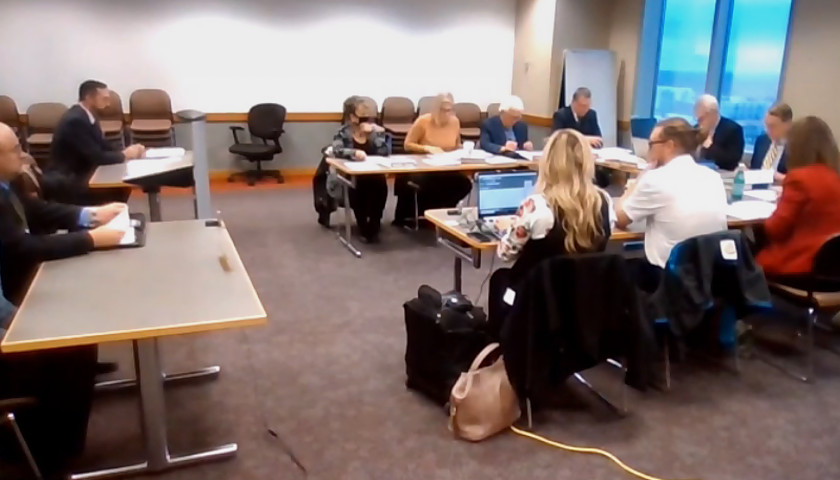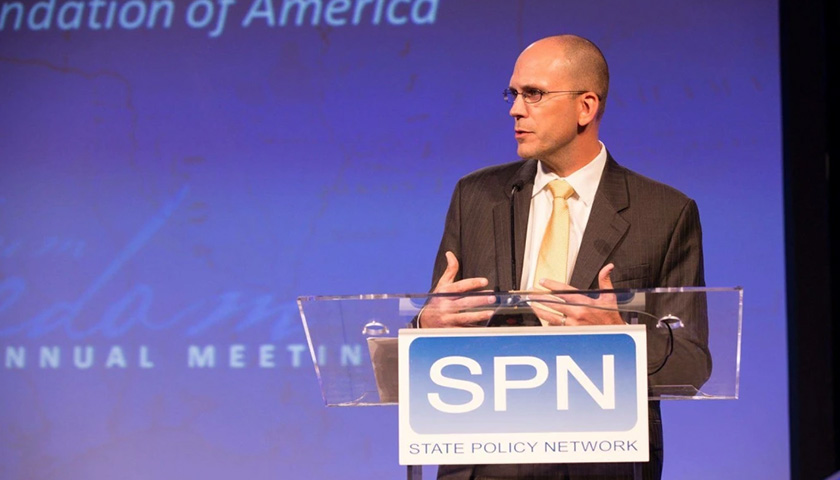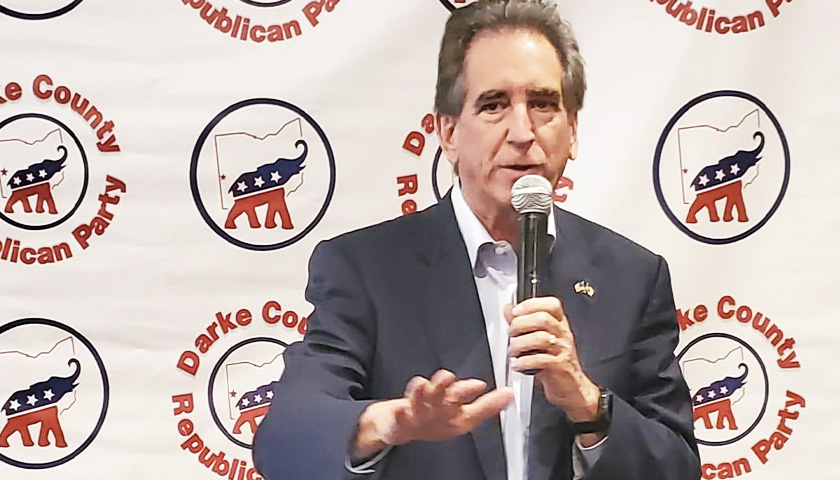An Ohio voter filed a writ of mandamus petition with the state’s Supreme Court Monday, asking the high court to order the Ohio Elections Commission to hold an expedited hearing on her two complaints filed April 7 against gubernatorial candidate Joe Blystone and his campaign committee.
“It was filed on behalf of Mary Capella, who’s a voter in Butler County, and it’s a challenge to the inaction and the avoidance responsibility by the Ohio Elections Commission to enforce the campaign finance laws of the state of Ohio,” said Curt C. Hartman, the Cincinnati elections attorney.
The suit names as defendants: Phillip C. Richter, executive director of the Ohio Elections Commission; and members of the commission, Otto Beatty II, Natasha Kaufman, D. Michael Crites, Christina M. Hagan, Ernest C. Knight and John A. Lyall, the graduate of Vanderbilt Law School said.
Hartman said the writ of mandamus, which is the Latin for “We command,” is an order from the judge compelling an official to either obey the law or otherwise perform his required duties, is necessary because of the cavalier attitude of Richter and the commission, who are willfully ignoring the Ohio statute that directs the commission to hold hearings on material complaints filed within 60 days of an election or primary.
The gubernatorial primary is slated for May 3, and Blystone is running against Gov. R. Michael DeWine and former congressman James B. “Jim” Renacci for the Republican nomination.
 Hartman said Capella’s complaints dealt with the Blystone’s campaign contributions and expenditures.
Hartman said Capella’s complaints dealt with the Blystone’s campaign contributions and expenditures.
“The whole essence of the campaign finance laws is open and timely disclosure of the information relative to campaign so voters can be informed about candidates, and Ms. Capella became aware through the campaign filings of the Blystone campaign in January of certain irregularities, both in terms of contributions and expenditures,” he said.
“We filed two complaints with the Ohio Elections Commission dealing with those issues, the contributions, and the expenditures, what appears to be the potential conversion of campaign funds for personal use, irregularities in fundraising, not reporting contributions, very similar to a complaint that was filed a few months ago against the Blystone campaign on a different finance report,” he said.
Hartman: Richter shrugged off action on Capella’s complaints with ‘good luck’
“The complaints that Ms. Capella filed with the Ohio Elections Commission, under state law, is entitled to an expedited hearing, essentially a preliminary hearing within two days, and then a full hearing within 10 days of that,” the lawyer said.
“Shockingly and disappointingly, the Ohio Elections Commission, or the executive director, essentially informed us on the Friday before we filed the lawsuit with the Supreme Court–on that Friday, he informed us that he was not going to expedite it and ‘good luck.’”
Hartman said his client had no choice but to ask the Supreme Court to order the commission to follow the law.
“We believe under state law, he has a clear legal duty to expedite the complaint with the Elections Commission,” he said. “So, this Monday, we filed what’s called a mandamus action with the Ohio Supreme Court to try to get a court order to force the commission to give us that expedited hearing.”
Hartman: Blystone campaign expenditures suggest a conversion of funds for personal use
“Under a campaign finance law, the expenditures by any campaign committee have to be for legitimate, necessary and ordinary campaign expenses,” Hartman said. “You can’t go buy a boat and say: ‘Hey, I’m going to host stuff on a boat and then turn around and use a boat for your personal.’”
In a campaign buys a vehicle, it must be for the exclusive use by the campaign, along with the maintenance of logbooks for mileage, maintenance, and other outlays associated with the vehicle, he said
In the case of Blystone, there are entries for bulk purchases of fuel, which may have been for personal use, he said.
There are also Blystone’s purchases of clothing, he said. “I actually conferred with Phil Richter at the commission, and it was: ‘Hey, those types of expenditures, generally speaking, are not allowable. You can’t run for office, raise money, and then go buy yourself a suit because that suit isn’t really a necessary and ordinary campaign expenditure; it’s something you use more for your personal use, even after the campaign.’”
It would be different if Blystone were buying a costume for his campaign.
“We got to get the facts clarified, but I think there’s at least a good faith and probable cause to raise the questions and say, we need to get the facts out, or the voters need to get the facts out,” he said.
“It’s one thing if you want to buy, let’s say, an Uncle Sam outfit just to march and a parade in, and you would never be caught dead in it in any other time,” he said.
Hartman: Blystone repeats his flawed reporting of cash contributions
Hartman said in his most recent report, which covered the second half of 2021, Blystone repeated his improper reporting of cash contributions that he had done in the report covering the first half of 2021.
“The most recent complaint dealt with the annual report that was just filed in January, and so it looks like the contribution stuff was the same,” he said. “Broad reports of locations or events without any attribution. It’s about $95,000 in this most recent report that really is not attributed to any specific individuals.”
A campaign does not have to report the name of a cash donor contributing less than $25, but campaigns have to track the contributions, nonetheless.
“In Ohio law, you cannot contribute cumulatively more than $100 in cash to a campaign,” the lawyer said.
“If people are making multiple cash contributions, there’s the prospect of that going up above and beyond that,” he said. “The other thing in terms of reporting is they do not have to report individual contributions of $25 or less. They have to keep track of it, but they don’t have to do a separate line entry.”
Hartman said Blystone’s campaign finance report makes a mockery of the cash contribution rules.
“The problem you have here is you’re getting a lot of $1,400, $2,000 reports of this location or this event,” he said. “If you look at this, like I said, about $95,000, if everybody gave the $25, you’re over 3,000 individuals—it’s 28 percent of the total contributions they raised.”
Former Blystone co-campaign manager Sarah Chambers filed a 51-page complaint Oct. 28 with the Ohio Elections Commission, which held an initial hearing, but then took no action.
“The same as the earlier-filed complaint, and the commission at least initially said: ‘Yes, there’s sufficient grounds here to move forward.’ We’re looking to do the same thing, but because of the timing of this complaint that we filed within 60 days, they have the obligation for that expedited hearing, which they are not giving us,” Hartman said.
“People need to have as much information, the full information, before the election, not after the election, not at six months, a year after the election, it does no good, and it undermines the purposes of the campaign finance laws.”
– – –
Neil W. McCabe is the national political editor of The Star News Network based in Washington. He is an Army Reserve public affairs NCO and an Iraq War veteran. Send him news tips: [email protected]. Follow him on TruthSocial & GETTR: @ReporterMcCabe





